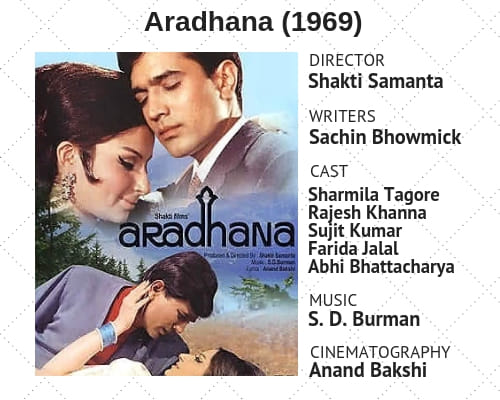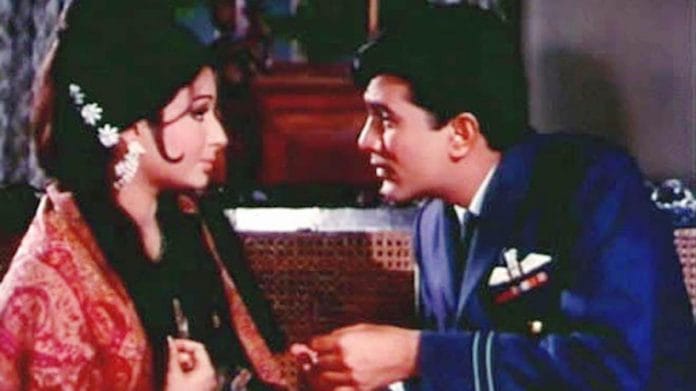On his 76th birth anniversary, rewatch Rajesh Khanna’s hit film with Sharmila Tagore that still holds a message for society.
India’s first superstar’ is how Rajesh Khanna is remembered today. But back in 1969,when Shakti Samanta’s Aradhana released, he was yet to deliver the historic “15 hits in a row”. The film propelled him to superstardom, even though the plot revolved around a female character.
The late actor would’ve turned 76 today.
Aradhana was a tear-jerker drama about a woman’s love, motherhood and that Thomas Hardy-esque twist of fate. Khanna starred in a double role as both a husband and a son.
 In this story about ‘devotion’ that also serves as a commentary on India’s conservative society, Samanta cast Sharmila Tagore, the reigning star of the time, as Vandana who faces the scorn of the people for having a child with a man without proof of marriage.
In this story about ‘devotion’ that also serves as a commentary on India’s conservative society, Samanta cast Sharmila Tagore, the reigning star of the time, as Vandana who faces the scorn of the people for having a child with a man without proof of marriage.
The film starts off with a trial scene, in an uncharacteristic non-linear sequence (written by Sachin Bhowmick), where Vandana is jailed for 14 years over murder charges. And the film shows a (traditional) flashback about how she reached this point.
Cut to one of the most loved Hindi songs of all time — ‘Mere Sapno Ki Rani’. In Darjeeling’s beautiful mountains, we meet Flight Lt Arun Verma, the Khanna we know today — with the signature head-tilt and hand movement. The Kishore Kumar playback, Khanna’s charm and, of course, his mannerisms serenade Vandana. (It also features Sujit, considered the ‘lucky mascot’ of Khanna.)
In a charming sequence, Vandana and Arun meet for the first time — a scenario that has since ‘inspired’ several Hindi romances — at her house while he goes seeking her doctor father Gopal Tripathi (Pahari Sanyal). Sparks fly immediately. The Air Force officer is certain of his commitment to the woman and gets married to her secretly at a temple. But fate has something else in store for both of them.
Also read: Try watching ‘Satyakam’ in the age of post-truth, fake news and incorruptible leaders
After a night of erotic passion, shot in a breathtaking single-shot, non-lip sync song ‘Roop Tera Mastana’, Arun dies in an air crash. But not before he leaves behind a pregnant Vandana, who has now been handed a lifetime of miseries. In earlier movies, this was usually shown as ‘paap’, but Aradhana treats it with a gentler knife – giving her agency.
While Arun’s family refuses to accept her and she decides to keep her ‘illegitimate’ child, troubles befall both Vandana and her father, who perishes to the sudden struggles late in his life. However, he does sing to her the words that ultimately come to define her and the film — “Saphal hogi teri aradhana (Your devotion will be answered)”.
To amp up the drama for Vandana’s self-sacrificial character, Samanta conjures up a series of conflicts that don’t end well for her. She lets a childless couple adopt her son, with the pledge to groom the child into becoming an Air Force officer, a promise she had made to Arun. She does find space in their house as a nanny, but soon after becomes a victim of the lust of her employer’s brother Shyam (Manmohan) and is jailed for his murder.
Fate, though, is still not done with Vandana. She gets out after 12 years only to come face to face with her Air Force officer son Suraj Saxena who doesn’t recognise her, something she is grateful for, given her past.
Also read: Devi to Kashmir ki Kali to Censor Board: Sharmila Tagore is not just Taimur’s grandmom
Despite the contrivances, it’s a sight to see a Hindi film star play a leading lady’s husband and son — a novelty that was actually inspired by 1946 Hollywood release To Each His Own. Credit to Tagore for picking a role that ‘aged’ her. The trio of Tagore, Khanna and Samanta went on to create another seminal romance in Amar Prem (1972).
If you mention Aradhana to anyone today, you’re most likely to hear about composer S.D. Burman and lyricist Anand Bakshi’s soundtrack. (R.D. Burman was credited as associate music director.) Featuring Lata Mangeshkar, Asha Bhonsle, Kishore Kumar and Mohd Rafi, the album’s most iconic song remains the bhajan-like devotional ‘Saphal Hogi Teri Aradhana’, sung by the composer himself. The album also had the lilting ‘He He’, synonymous with Khanna now, in the lovely ‘Kora Kagaz Tha Ye Man Mera’.
Almost five decades later, Aradhana still holds up. It’s certainly a weepy melodrama that may seem at odds with the realistic approach of today’s filmmakers, but it stands out for its convictions — an aspiration for a society that should be far less cruel on its people than it is. That the film was Indian audiences’ first major encounter with the blazing charm of Khanna makes it even more accessible.
This article has been updated to reflect changes.







As a schoolboy, older sisters vetoed my seeing the film, courtesy the Roop Tera Mastana song. Whenever I wanted to read some of the books they had, the favourite put down would be : This is not meant for you.
I really enjoy reading this article, with the Song clips added in. A very good format for info and to enjoy. Thanks!!